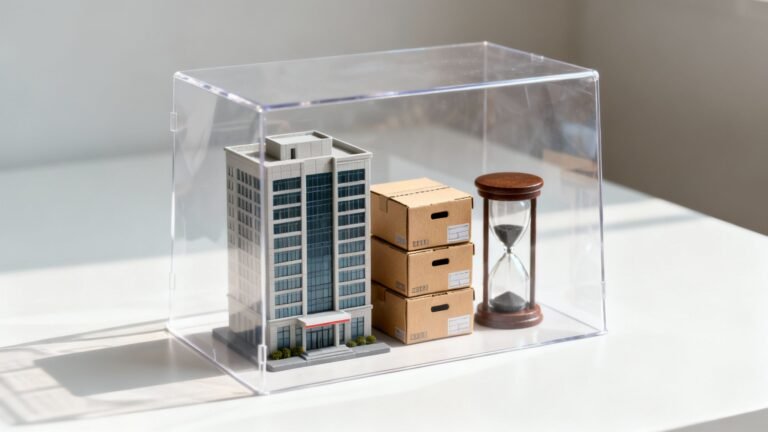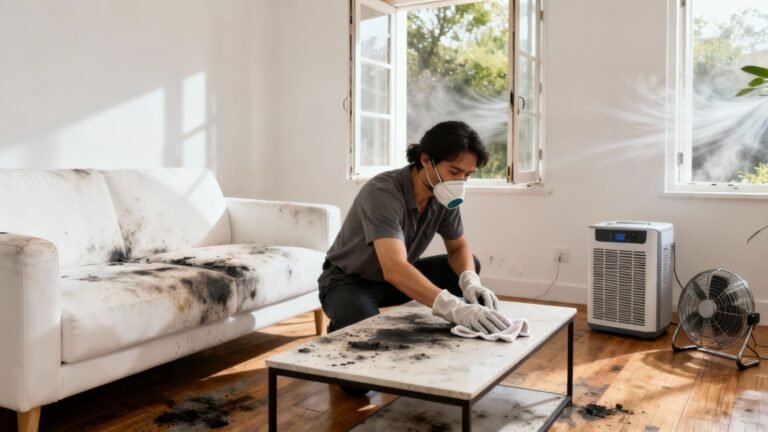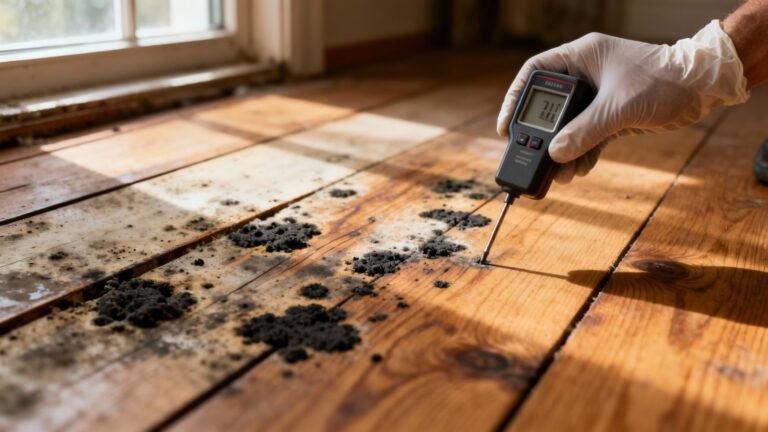
What Does Commercial Property Insurance Cover? A Guide for Los Angeles Owners
Think of your commercial property insurance as a financial safety net, purpose-built to catch your business when disaster strikes. It's
Mold infestations in commercial buildings are more than just an inconvenience. They create health hazards, damage structural materials, and expose business owners to liability risks. For Los Angeles and Southern California businesses, where seasonal rains, coastal humidity, and aging buildings are common, mold is a serious and often hidden danger.
This guide explains the risks mold poses in commercial settings, the causes of infestations, professional solutions, cost factors, and how insurance can play a role in protecting your property.
Commercial properties differ from homes. With larger square footage, shared ventilation systems, and heavy daily use, they are uniquely vulnerable to mold outbreaks.
Mold spores can circulate through HVAC systems and contaminate indoor air. Exposure often leads to respiratory issues, headaches, and allergy flare-ups, affecting both staff productivity and tenant comfort.
Mold gradually weakens building materials like drywall, carpet, and insulation. Over time, this hidden damage can compromise the structural integrity of offices, warehouses, or retail spaces, leading to costly repairs.
When mold is left unaddressed, businesses may face lawsuits or insurance disputes. Tenants and employees can claim unsafe conditions, creating financial and reputational risks for property managers.
Mold needs three things to thrive: moisture, organic material, and poor airflow. Commercial buildings often provide these conditions without notice.
Leaks from storm-damaged roofs, broken pipes, or faulty plumbing systems allow moisture to seep into hidden spaces, creating ideal environments for mold colonies.
Poorly maintained HVAC systems can harbor mold inside ducts and spread spores throughout the property. This makes routine inspections and filter changes essential.
Rooms with inadequate ventilation—such as basements, storage areas, and restrooms—often trap humidity. Persistent dampness in these spaces accelerates mold growth.
Older commercial properties in Los Angeles often lack modern waterproofing or drainage systems. Worn-out construction materials are more vulnerable to water intrusion and mold damage.
DIY cleaning may mask visible mold but fails to eliminate hidden contamination. Certified professionals use proven protocols to ensure safe and lasting results.
The process begins with detailed inspections and air-quality tests. Professionals identify mold species, measure spore levels, and assess the extent of contamination.
Affected areas are sealed off with barriers and negative air machines. Contaminated materials are safely removed or treated with antimicrobial solutions to prevent cross-contamination.
Industrial-grade dehumidifiers and HEPA air scrubbers remove excess moisture and airborne spores. Complete drying ensures mold cannot regrow.
After remediation, specialists recommend prevention strategies. These may include waterproofing, improved ventilation, or installing leak detection systems.
The cost of remediation depends on the building size, extent of damage, and accessibility of affected areas.
Smaller jobs, such as a single office or restroom, typically range from $3,000 to $8,000. These involve drywall removal, localized cleaning, and limited HVAC work.
Projects affecting multiple rooms or partial HVAC systems often cost $10,000 to $30,000. These require extended containment, industrial drying, and more extensive material replacement.
Widespread contamination in office buildings, schools, or retail spaces can exceed $50,000. These large-scale jobs involve significant demolition, full HVAC sanitation, and weeks of restoration work.
use our
to estimate project costs for your property.
Insurance policies vary widely, and mold coverage is often limited. Understanding your policy details is key to avoiding financial surprises.
Policies may cover mold remediation if caused by sudden events like burst pipes, fire sprinkler discharge, or storm-related roof damage. These situations are often considered “covered perils.”
Damage from gradual leaks, poor maintenance, or flooding is usually excluded. Many policies cap mold coverage at $5,000–$10,000, which may not cover large-scale projects.
Business owners should review their policies annually, ask about mold endorsements, and document all water-related incidents. Consulting with an adjuster before remediation begins can help maximize coverage.
our
provides more details on how carriers like State Farm, Farmers, and Liberty Mutual handle mold claims.
A Glendale office reported musty odors and employee health complaints. Testing confirmed mold inside HVAC ducts and behind drywall caused by a roof leak.
3,500 sq. ft. affected area
Full HVAC cleaning and sanitization performed
Moldy drywall and insulation replaced
Roof waterproofing installed to prevent recurrence
The project cost over $25,000, but remediation prevented further damage and liability issues.
Prevention is always more affordable than remediation. Property managers can reduce risks by:
Scheduling quarterly roof, plumbing, and HVAC inspections
Keeping humidity levels below 50% with dehumidifiers
Installing leak detection systems in vulnerable areas
Training employees and tenants to report leaks promptly
Partnering with a certified Los Angeles remediation company for regular inspections
Mold in commercial buildings is a hidden threat with far-reaching consequences. From employee health to structural safety and legal liability, ignoring mold is a costly mistake.
Business owners and property managers in Los Angeles and Southern California can protect their investments by taking proactive steps: perform regular inspections, respond quickly to leaks, and partner with certified mold remediation professionals.
Early action today prevents expensive downtime and liability tomorrow.

Pete Mantizian is the dedicated owner of Onsite Pro Restoration. He is driven by a passion to improve living conditions and prevent health issues caused by improper restoration. With over 10 years in construction and 7 years in restoration, Petros has managed projects for major franchises like Serv-Pro and 911 Restoration. He holds certifications in Applied Structural Drying, Microbial Remediation, and more. Committed to excellence, Petros ensures every project is done right the first time. Outside of work, he cherishes time with his loving wife and two children, balancing his fulfilling career with creating lasting family memories.
Share
Mold in offices, warehouses, or rental spaces can put tenants and employees at risk. Call (818) 336-1800, email info@onsitepro.org, or complete the form below to speak with our commercial mold specialists. We’ll provide fast assessments, clear solutions, and professional remediation to protect your building and business.

Think of your commercial property insurance as a financial safety net, purpose-built to catch your business when disaster strikes. It's

Getting rid of fire smoke odor in a house is a bigger job than just covering up the smell. It’s

Finding dark, ugly spots on your beautiful hardwood floors is a gut-punch for any homeowner. It’s not just an aesthetic